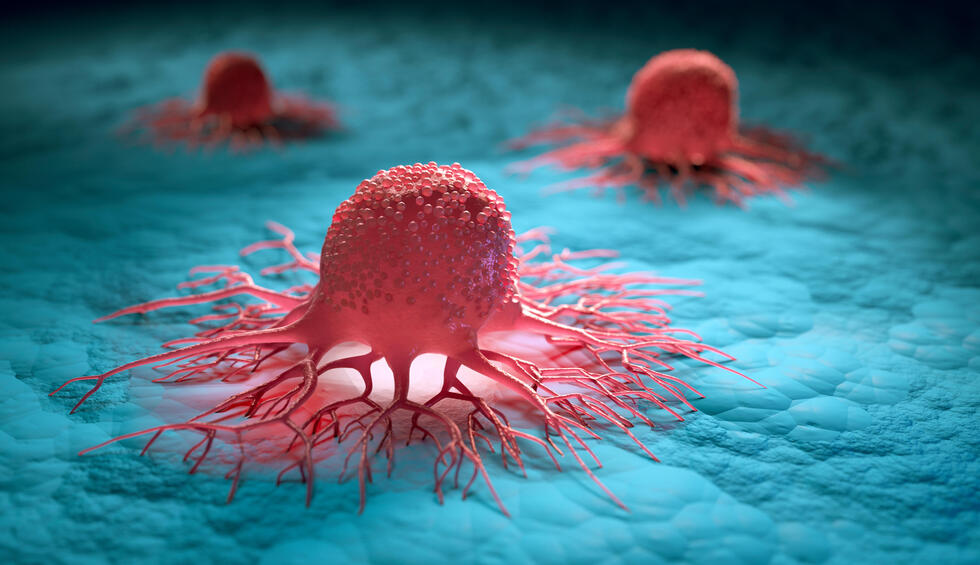
Medicine, Dentistry, and Pharmacy
November 10, 2023
Tumor marker detects gastric cancer with nearly 90% accuracy
A research team led by the Nagoya University Graduate School of Medicine has discovered that the stromal cell-derived factor 4 (SDF-4) protein is a reliable cancer marker. As simple blood tests accurately detect the protein, their findings suggest the potential of the marker in the early detection of gastric cancer.
Gastrointestinal cancers, such as oesophageal, gastric, colorectal, liver, and pancreatic cancer, are often found too late for effective treatment. Therefore, a marker is desperately needed. A marker is a biological substance that shows the existence of a tumor. Doctors can use it to find, diagnose, and monitor cancer and treatment. For cancers, such as gastric cancer, performing therapy at an earlier stage achieves more favorable results and increases the survival rate.
“Currently, blood tests to detect cancers, such as gastric, colorectal, and breast cancer, have used tumor markers like CEA and CA19-9. However, these tumor markers do not always accurately detect all cancers, and their accuracy needs to be improved,” said Dr. Takahiro Shinozuka, the first author of the study. “Other markers have been proposed but have drawbacks, such as intricate, costly measurement procedures or invasive testing methods, that prevent their use.”
The group led by Professor Yasuhiro Kodera, Dr. Mitsuro Kanda, and Dr. Shinozuka wanted to create new tumor markers to detect different types of cancer at an early stage. The researchers investigated proteins secreted by cancer cells and identified SDF-4 as a useful candidate. When they measured the concentration of SDF-4 in blood samples from cancer patients and healthy individuals, they consistently found elevated levels in cancer samples, including those taken from gastric, esophageal, colorectal, pancreatic, breast, and liver cancer patients. They reported these findings in Scientific Reports.
In cancer diagnosis, sensitivity and specificity are important. Sensitivity shows how well the test finds the disease in sick patients, whereas specificity shows how well it finds the disease in healthy patients. Testing their protein, the group found that it had a sensitivity of 89% and a specificity of 99%. These results exceeded the sensitivity of conventional tumor markers (13% for CEA and 17% for CA19-9) in identifying cancer patients. The protein was found in high levels even in patients with stage I gastric cancer, suggesting that it may be able to detect cancer early, before symptoms show.
“There are two ways in which SDF4 outperforms conventional tumor markers as a diagnostic marker. The first is that it can diagnose patients with early-stage cancer and the second is that it is useful as a diagnostic marker for various types of cancer,” Shinozuka said. “We are working with a company to develop measurement devices that can be used for cancer screening. If these efforts are successful, we hope to introduce SDF4 into actual cancer screening, helping in the early detection of cancer.”
The study, “Identification of stromal cell-derived factor 4 as a liquid biopsy-based diagnostic marker in solid cancers,” was published in Scientific Reports on September 20, 2023, at DOI: 10.1038/s41598-023-42201-2.
Authors:
Takahiro Shinozuka, Mitsuro Kanda, Dai Shimizu, Shinichi Umeda, Hideki Takami, Yoshikuni Inokawa, Norifumi Hattori, Masamichi Hayashi, Chie Tanaka, Goro Nakayama, and Yasuhiro Kodera
Media Contact:
Matthew Coslett
International Communications Office, Nagoya University
Email: icomm_research@t.mail.nagoya-u.ac.jp
Image credit: peterschreiber.media / Adobe Stock